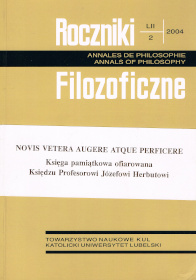Theological and Worldview Relevancy of the Philosophy of Nature
Abstract
While establishing the first type of relevancy, one takes into account the standard issues of the classical philosophy of nature. In particular, they are focused on the question of hylomorphism, evolutionism and miraculous events. This type of relevancy is defined through the relationships between the results of the natural sciences. They imply philosophical problems, a fact that enables us to establish the relationships between these sciences and theology. As a rule, it is the philosophy of nature and philosophy of God (I. G. Barbour, A. Anderwald) that play the role of mediators between the natural sciences and theology. The problems in question continue the relationships between evolution and creation, between science and religion, or religious faith, and between theology and the natural sciences.
A discussion on the second type of relevancy depends to a large extent on the aspectual additional definitions of its terms. Obviously, they contain the concepts of science, philosophy, worldview, ideology, religion, and theology. These explicative manoeuvres allow us to take advantage of the strategies, introduced beforehand, of establishing the relationship between science and religion. It is essential for our context to construct a coherent image of the world, an image that is characteristic of the philosophy of nature. This image combines some aspects of science, philosophy, including metaphysics, ethics, and theology.
Copyright (c) 2004 Roczniki Filozoficzne

This work is licensed under a Creative Commons Attribution-NonCommercial-NoDerivatives 4.0 International License.





